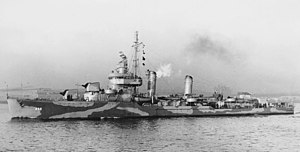USS Kearny (DD-432)
 |
|
| History | |
|---|---|
|
|
|
| Name: | Kearny |
| Namesake: | Lawrence Kearny |
| Builder: | Federal Shipbuilding and Drydock Company |
| Launched: | 9 March 1940 |
| Commissioned: | 13 September 1940 |
| Decommissioned: | 7 March 1946 |
| Struck: | 1 June 1971 |
| Fate: | Sold for scrap, 6 October 1972 |
| General characteristics | |
| Class and type: | Gleaves-class destroyer |
| Displacement: | 1,630 tons |
| Length: | 348 ft 3 in (106.15 m) |
| Beam: | 36 ft 1 in (11.00 m) |
| Draft: | 11 ft 10 in (3.61 m) |
| Propulsion: |
|
| Speed: | 37.4 knots (69.3 km/h; 43.0 mph) |
| Range: | 6,500 nautical miles (12,000 km; 7,500 mi) at 12 knots (22 km/h; 14 mph) |
| Complement: | 16 officers, 260 enlisted |
| Armament: |
|
USS Kearny (DD-432), a Benson-Livermore-class destroyer, was a United States Navy warship during World War II. She was noted for being torpedoed by a German U-boat in October 1941, before the U.S. had entered the war. She survived that attack, and later served in North Africa and the Mediterranean.
She was named for Commodore Lawrence Kearny (1789–1868).
Kearny was launched 9 March 1940 by the Federal Shipbuilding and Drydock Company in Kearny, New Jersey, sponsored by Miss Mary Kearny. She was commissioned on 13 September 1940, Commander Anthony L. Danis in command.
After shakedown and sea trials, Kearny got underway 19 February 1941 from New York Harbor for St. Thomas, Virgin Islands, where she took part in the Neutrality Patrol off Fort de France, Martinique, French West Indies, until 9 March. The new destroyer patrolled around San Juan, Puerto Rico, and escorted ships in the Norfolk area until August when she sailed for NS Argentia, Newfoundland, to escort North Atlantic convoys.
In October 1941, while the U.S. was still neutral in World War II, Kearny was docked at Reykjavík, in U.S.-occupied Iceland. A "wolfpack" of German U-boats attacked a nearby British convoy, and overwhelmed its Canadian escorts. Kearny and three other U.S. destroyers were summoned to assist.
...
Wikipedia
